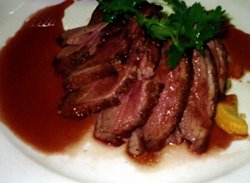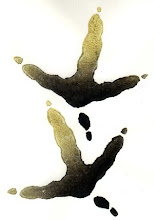
So it was my turn to don the mantle of "The Reluctant Gourmet" in the conspicuous absence of the Great Gourmet and Grand Gourmand, our own Peter Kleinman. And we had killed more than a few ducks on our opening day at Black Lake, 2006. ( I hope those stories are forthcoming.)
The menu was hoped to be elegant yet simple. Pan-seared duck and wild rice, a nice Finger Lakes wine, and a mixed greens salad with viniagrette. After a misfire with the finicky gas stove at "our" lodge over looking the Narrows of Black Lake, called Lakewood, I was off and cooking. Things went right and dinner was served...or at least that was how it could have been.
For the record, and in my defense, naturally, I felt I would do my good comrades in arms some small service in at least providing justification for my culinary choices, said choices having been foisted upon two unlucky comrades at least one other time.
According to L. P. De Gouy, author of the Bible of wild fish and game culinary artistry The Derrydale Cook Book of Fish and Game (1937), "The different methods of preparation of all the wild ducks including mallard, canvasback, and ruddy ducks, may be applied to the teal duck. Without exception, wild ducks should be cooked and served rare" (p.113). De Gouy goes on to say, "I have no apostolic (should we say academic instead) avocation, but if I had been a missionary instead of a chef, it would have been most certainly my irresistable duty to convert the culinary barbarism, the vandals, who under the pretense of enjoying a duck, be it wild or domestic, begin to bleed completely this delicious bird. They most certainly do not know that the duck. above all its excellent gifts in cookery, is a philosopher (my emphasis) and as such never worries, never frets, and never loses its presence of mind, having a sort of knowledge that it was born to end in a pot for the enjoyment of the human species. Then why throw away (or cook away) what is best, what is most precious in it--its blood?"(p. 126).
Irma Rombauer, the author of the bible of all cooking, The Joy of Cooking (I have the 1995 version) echoes the sentiment above when she writes "...most dark fowl is cooked vert-cuit or saignant, that is, roasted brown on the outside under high heat, but still rare and running with juice and blood within" (p. 436).
So I didn’t break any rules. No breech in culinary tradition, cultural norms or mores. But Taste, Taste is a finicky thing. There is of course the way food tastes. That kind of taste is comprised of five primary senses detected on the palate. They are salt, sour, sweet, bitter, and "umami"-a Japanese word describing a savory essence. All foods exhibit one or more of these components. Then there is Taste.
Taste (according to Wikipedia) refers to appreciation for aesthetic quality, significantly applying the purely physical term to an intellectual quality. In such contexts Taste begins to be used in a metaphorical sense to refer to certain degrees of cultural competence, closely related to the concept of discrimination; it can set distinctions between "tasteful" and "tasteless" or the embodiments of "good taste" or "bad taste", thus providing categories for social division and reinforcing cultural hierarchy.
So, Taste came into play at Duck Camp. Put simply, no matter what culinary luminaries like De Gouy and Rombauer have to say about internal temperatures of duck breast, the Band of Brothers at Black Lake Duck Camp insisted that red inside was tantamount to cultural incompetence and in bad taste, thus reinforcing a social hierarchy, in which I, the cook, was commanded to return to my post immediately and remedy the transgression post haste, which I dutifully did. I did my best to salvage the duck meal, but felt the sting of having been besmirched. Worse, this was a repeat performance, as I had served rare duck once before, with similar reviews, as I mentioned earlier. And of course, we are now dealing with the specter of Avian Bird Flu, complicating the Duck tar-tar issue considerably.
So here it is, my mea culpa. I am guilty of the aforementioned breech of taste, at least that of the Black Lake Band of Brothers, for which I humbly repent. I promise I will never burden my friends with bloody duck breasts again, so help me God.









7 comments:
JT, For what it's worth you can cook up duck on the rare side for me any day.
man, that's got to be the best culinary review ever written from a hunting camp . . . nice work.
Ernie, perhaps you confuse me with KGT? or perhaps is that a sly allusion to you wanting someone other than KGT to be the judge of "rare"?
For the record, there is a real difference, ontologically speaking (Ernie Meter swinging wildly on that one), between "rare" meat and "raw" meat. One is cooked, the other is uncooked. By definition.
Webster's tells us that "rare" can be defined as follows:
Main Entry: 2rare
Function: adjective
Inflected Form(s): rar·er; rar·est
Etymology: alteration of earlier rere, from Middle English, from Old English hrEre boiled lightly; akin to Old English hrEran to stir, Old High German hruoren
: cooked so that the inside is still red [rare roast beef]
Rightly, Cabin Boy emphasizes the color "red" in his defense of serving duck tar tar (nice going Eric on that one!). Red, however, is not a necessary and sufficient condition for the proper determination of "cooked rare" status. Duck flesh in its native state is also red; we would not, however, argue that a duck on the lake is a cooked duck--unless you are Pete about to attempt to water-sluice a "reluctant to fly" ruddy duck that has just swum into your decoys.
Whereas "raw" is defined as follows:
Main Entry: 1raw
Pronunciation: 'ro
Function: adjective
Inflected Form(s): raw·er /'ro(-&)r/; raw·est /'ro-&st/
Etymology: Middle English, from Old English hrEaw; akin to Old High German hrO raw, Latin crudus raw, cruor blood, Greek kreas flesh
1 : not cooked
2 a (1) : being in or nearly in the natural state : not processed or purified [raw fibers] [raw sewage] (2) : not diluted or blended [raw spirits] b : unprepared or imperfectly prepared for use c : not being in polished, finished, or processed form [raw data] [a raw draft of a thesis]
3 a (1) : having the surface abraded or chafed (2) : very irritated [a raw sore throat] b : lacking covering : NAKED c : not protected : susceptible to hurt [raw emotions]
4 a : lacking experience or understanding : GREEN [a raw recruit] b (1) : marked by absence of refinements (2) : VULGAR, COARSE [raw language] c : not tempered : UNBRIDLED [raw power]
5 : disagreeably damp or cold [a raw winter day]
Here is the nub of the matter. The mere existence of the thin penumbra of grey color that surrounded the massive dark beet red interior of Cabin Boy's duck breasts a la Black Lake was not enough to guarantee that the inside flesh was indeed cooked.
In fact, I draw your attention to meaning number 5 under "raw": "disagreeably damp or cold." I would submit that again by this defnition of the term raw, Cabin Boy's first, fresh-from-the-frying-pan offering was in fact, uncooked.
But of course this is a matter of Taste, capital T, as Cagey has argued. I am wholly in agreement with him. To each his own. As the camp's resident Libertarian, I would say let each be allowed to pursue and enjoy the elegantly cooked flesh of duck in his own way, and not in his neighbor's or brother's or bunkmate's instead. Viva la choix! better to err on the side of undercooking the duck so as to allow for the possibility of its return to the kitchen, than to overcook it from the start, in which case pizza should immediately be ordered.
Nice work all around Cagey. For those of us who prefer our duck a bit warmer on the inside, you have our thanks. Your courage and humility in the face of culinary mutiny saved the meal for all!
... I'll second Jim's opinion. That was very well written, a great read on a Wednesday morning stuck in the office.
Boyz:
I can't believe I'm blogging...
I am still salivating from Chef Keith's description of the meal, including the rare duck.
I sent the following complementary advice to Keith by e-mail:
(1) do most of the cooking on one side, a la filet mignon or scallops.
(2) pound the hell out of the steak to flatten it a bit and tenderize it at the same time.
(3) My version of magret de canard.. Leave a bit o' skin on the breast, and take the steak from high flame (searing) to oven, where you finish it off at a relatively low. Now that I think of it, this is also done with filet mignon.
The final thing is sauce. Chef Keith's amazingly talented wife makes some of the most complementary sauces I've had. A little sauce goes a long way toward hiding blood, especially if it's red sauce, from weak stomached sissies.
Here's to Montezuma's revenge!
Pete
Cabin Boy, My sincerest of appologies. It must have been all of the references to cookbooks and internet forwards that threw me off so much that I didn't notice the post was from you instead of that culinary master butcher JT. I actualy was going to reference a nice cookout that you did for the boys down at the double black in my post. As I said by mistake, to MR. JT, you can cook my duck on the rare side any day. There was discussion at the Islands this weekend about the great job you did last year cooking up the days fare.
I agree with Blogging Brother Pete about the importance of a fine sauce. In fact my only complaint about the meal was the absence of a certain deep, rich, maple syrup flavor that would have completed Keith's culinary masterpiece.
I was informed that the camp's maple syrup mysteriously disappeared on the afternoon of the 7th.
Where were you, Dr. Dirt, on the afternoon of the 7th?
I see that a reward has been posted for info re the syrup.
This from the Food Poisoning Law Blog:
May 9, 2006 | Posted By Pritzker | Ruohonen | 0 Comments | print this article
Bird Flu and Meat and Blood
"Scientists in Vietnam have data suggesting that people are able to contract the bird flu (H5N1 virus) by ingesting undercooked meat and blood. According to Virologist Menno de Jong, who is head of the virology department at the Oxford University Clinical Research Unit in Ho Chi Minh City:
" 'In a number of patients the only exposure risk has been drinking raw duck blood (emph added). That could imply that the gastrointestinal tract is also a route of transmission or a route of first infection, and there are experiments in animals' that suggest this (Bloomberg).
"Cooking kills the bird flu virus, but, as with other foodborne pathogens, there is the issue of contamination of other food products. If the blood of an infected bird gets onto some lettuce, that lettuce could then be a potential source of bird flu infection. "
Jim here: so there you have it. Eric's point about bird flu not so far off--except geographically, I suppose, at least this year. Isn't Josh our resident authority on FWS documents pertaining to bird flu? what say ye, Josh?
Post a Comment